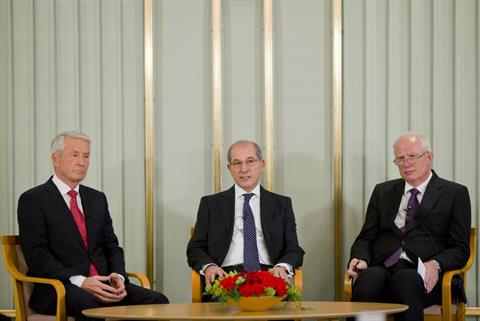Syrian army retakes road needed to ship out chemical arms
BEIRUT: Syrian President Bashar al-Assad’s forces have taken control of a highway connecting Damascus to the coast that is needed to extract hundreds of tonnes of toxic chemicals for destruction, state television said on Monday.
Russia said it could provide transport for the chemicals to get them to the port of Latakia for removal.
Nevertheless, Ahmet Uzumcu, head of the global chemical weapons watchdog, said it would be hard to remove all of Syria’s deadliest chemical arms from the country by a Dec. 31 deadline.
Fighting in Syria poses a major hurdle to efforts by the Organisation for the Prohibition of Chemical Weapons (OPCW) to eliminate the government’s chemical arsenal.
The army started an offensive in mid-November to secure the highway, which passes through the mountainous area of Qalamoun, roughly 50 km (30 miles) north of Damascus, stretches along the Lebanese border and hosts many military bases and outposts.
The army has retaken the highway towns of Qara and Deir Attiyah from mostly Sunni Muslim rebels fighting to oust Assad and on Monday state TV broadcast footage from the town centre of Nabak which it said was captured from “terrorists” on Monday.
Rami Abdulrahman, head of the anti-Assad Syrian Observatory for Human Rights monitoring group, said the highway remained vulnerable to rebel attack despite opposition losses.
Rebels in the area did not respond to requests for comment.
Syria has agreed under a deal arranged by the United States and Russia to dismantle its chemical arsenal and destroy all its 1,300 tonnes of sarin, mustard gas and other lethal agents.
The agreement averted threatened U.S. missile strikes after a sarin gas attack killed hundreds near Damascus in August.
The size of the stockpile requires it to be transported by land and sea, using roads linking Damascus and other areas to the Mediterranean port of Latakia, a government stronghold.
Russian Deputy Foreign Minister Mikhail Bogdanov said that Moscow, which has given Assad weapons supplies and diplomatic support, could help with the chemical arms transfer.
“Transport, yes… the issue is being discussed,” Bogdanov told reporters when asked whether Moscow could provide security or transport to help get the weapons to Latakia.
The West has rejected a Syrian request for equipment including armoured vehicles for the chemical convoys, citing fears it could be used by government forces against the rebels.
The Hague-based OPCW has been charged with supervising the elimination of Syria’s chemical arsenal. The most dangerous chemical weapons have to be removed by Dec. 31 while weapons in a second category have to be shipped out by Feb. 5.
“In view of the circumstances in this country, it will be quite difficult to meet this timeline,” Uzumcu, who is in Oslo to accept the 2013 Nobel Peace Prize for the OPCW on Tuesday, told a news conference.
Uzumcu cited difficulties including security, especially on secondary and access roads to various sites, and a strict verification process requiring extensive cooperation with Damascus. But he said a mid-2014 deadline to have all the weapons destroyed remains realistic.
The United States is donating a naval ship and equipment to destroy Syria’s chemical arsenal, but there is no agreement yet about where it will anchor while the work is carried out.
Syria’s conflict began with peaceful anti-Assad protests in March 2011 and developed into an armed insurrection when these were violently suppressed. More than 100,000 people have been killed and fighting has broadly settled into a stalemate.
Hardline Islamist groups have exploited the power vacuum in many rebel-held areas to exercise their authority at the expense of more moderate opposition factions.
The Observatory reported on Monday that members of the al Qaeda-linked Islamic State of Iraq and the Levant had executed a diesel vendor in Idlib province on charges of blasphemy.
It said the man suffered from a mental illness and had jokingly asked the militants if they thought he was “the god of fuel” after they complained that his supplies were watered down.
The Observatory sent a picture it said was of the man, with bullet holes in the head, lying in the street, where it said the militants left him. He had three children, it said.
dailystar
(The Daily Star :: Lebanon News :: http://www.dailystar.com.lb)


